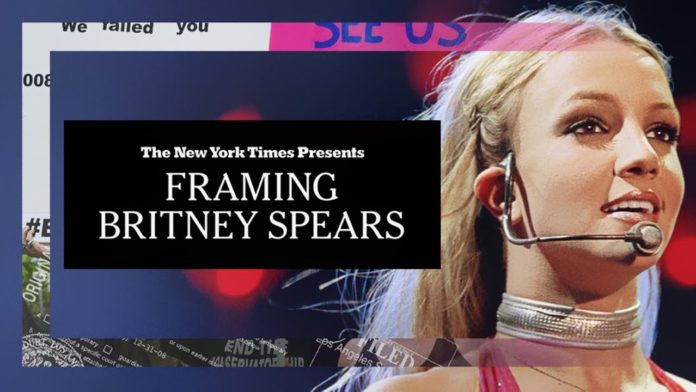After watching the controversial “Framing Britney Spears” documentary, blogger Najm Al-Din argues that only faith-based values can counter the bigotry women are subjected to in western cultures which are detached from the strong moral anchors of chastity, modesty and marriage.
With much of the world in lockdown, it can be dispiriting to experience life when isolated from our wholeness. But a silver lining of seclusion is that it places us into a more introspective state.
As a result, we are likely to be more sympathetic and sensitive to something as mundane as the perils of celebrity and pitfalls of fame, which on any given day would be run-of-the-mill content to fill the gossip columns.
This probably explains why the sobering Framing Britney Spears documentary has pulled at the heartstrings of millions around the world. From die-hard fans to casual onlookers, people from all walks of life have reacted with an air of poignancy to the heart-wrenching story which charts the pop icon’s rise to stardom, the tabloid obsession with her personal life and precipitous fall from grace.
Free Britney
The New York Times documentary has renewed public interest in a court-approved conservatorship which stripped the pop sensation from her civil rights. It also spawned the Free Britney movement and the viral hashtag which followed in its wake saw millions petition for the singer to be legally freed from her father’s guardianship and regain control over her finances and independence.
The turmoil in which Britney is tragically mired continues to resonate powerfully for various reasons. Many perceive her predicament as speaking directly to a universal desire for freedom and justice. The unprecedented outpouring of emotion is also tied to the shameless sexism she endured as a child and then as a teenager on the brink of fame.
Subscribe to our newsletter and stay updated on the latest news and updates from around the Muslim world!
The pop star’s contemptible treatment at the hands of a morally inept press and predatory paparazzi captures this painful reality. She was barely on the cusp of adulthood when rumours surrounding a breast augmentation and fixation with Britney’s virginity become cheap fodder for journalists.
The feeding frenzy continued well into her adolescence where her mental health took a nosedive. Everything from the tumultuous split with Justin Timberlake, acrimonious divorce with Kevin Federline, and a highly publicised meltdown which saw the popstar lose custody of her children and then involuntarily committed to a psychiatric ward a year later came under a barrage of intrusive media scrutiny.
Replaying this montage of abuse was tough viewing but suddenly brought to the fore an important cultural conversation which highlighted the all too familiar tragedy of celebrities being pulverised by the very forces which feted them.
As well-intentioned as our sympathies might be, there is a tendency to miss the forest for the trees by misdiagnosing the causes behind the pernicious misogyny which pervades the music industry. We cannot make any meaningful sense of the damage inflicted against Britney unless we shine a light on the very culture which goaded her with hollow promises of success and fulfilment.
Feminism
Interrogating the values which Britney embodied at the height of her powers explains why she was always ripe for the picking.
Despite the evident contradiction of harnessing girl power in an industry where men predominantly dictate how women express their sexual mores, Britney was carefully curated as a symbol of sexual power which the prevailing secular liberal culture champions as a form of female agency.
This merits a deeper inspection into the troubling relationship between feminism and pop music. The pop culture that awarded her such glamour and sparkle is steeped in the logic of third-wave feminism which differs from its previous iterations as it encourages women to reclaim and embrace pejoratives such as “bitch” and “slut” as expressions of liberation.
Britney was simply conforming to this toxic message of desirability which has been hardwired into western liberal cultures for a generation. Like millions of young girls who subscribe to the same understanding of womanhood, she was sold on the idea that self-worth and existential meaning could be attained through the continued production of sexualised representations of women.
Sex sells
This is where the cracks in the feminist narrative begin to show.
Not only does it entice women into the undignifying behaviour of reducing their self worth to sexuality alone, it is also counter-intuitive to its pursuit of subjectivity. Ultimately, the physical form which women purportedly claim for their own purposes of deconstructing and reconstructing gender norms is co-opted by the hegemonic gender discourse, which encourages women to exploit their bodies as a means of capital exchange.
Far from breaking new ground and pushing the envelope, it completely eluded Britney that perhaps she was a passive object of the male gaze all along whose image amounted to a faux-empowerment.
This commercial exploitation of women’s images is ubiquitous across the music, cosmetics and fashion industries and should not be perceived as an aberration from western gender norms. Rather, this is the norm and it naturally thrives in permissive environments where men are licensed to lust and insecure young women are constantly agitating to prove their social capital by utilising their bodies for public consumption.
For a young girl saddled with the weight of expectation, being thrust into an industry so glutted with sexual stereotypes was always fraught with calamity. This was a world where sex must sell if women want to enjoy a modicum of success and compete on the same terms as their male counterparts.
Surrounded by voyeuristic vultures with vested interests in marketing an airbrushed sexuality, it should come as no surprise that Britney shed her image of an innocent teen from humble beginnings and reinvented herself as the queen of raunch, where only gutsy performances which oozed sexual confidence and bordered on soft-porn would drive sales and promotion.
Women’s rights
Feminist readers will undoubtedly accuse me of undermining a woman’s right to sexual agency. But now is not the time to issue a paranoid defence of western freedoms and leave the ideological tug of war between radical libertarian and culturalist feminists to politely iron out their differences.
Instead, we must place the thorny subject of women’s rights under the microscope by exposing how the psychology which underpins the attitude of many western women vis-a-vis sex and gender is dysfunctional at its core.
The culture which bred these freedoms vaunted girls like Britney for being ambassadors of hyper-sexualisation before slut-shaming them for sticking to the programme. The lesson we can learn from her misfortune is that feminism has reached an impasse and has aided and abetted the forces of sexual predation, causing abject misery and distress by selling a false pretence of autonomy and empowerment.
Therefore, the abuse which Britney sustained is nothing but a damning indictment of secular liberal values as the unholy trinity of individualism, moral relativism and feminism sapped the life from her before any hounding photographer ever could.
Healing through faith
So where can we look to square the circle and find any meaningful respite from casual sexism? I believe the answer lies in the values and institutions which are traditionally the bane of the feminist movement.
We must appreciate that Britney’s encounters with bigotry were ultimately inevitable in a culture which is detached from strong moral anchors and where the virtues of faith, chastity, modesty and marriage are treated as outdated cultural pathologies and erroneously perceived as legitimating the oppression of women.
However, the important function of these values and their ability to create wholesome and cohesive societies which respect healthy boundaries between genders have been proven over a millennia and offer natural buffers against sexism and bigotry.
In this regard, the moral imperatives of Islam and Christianity and their orthodox adherents who imbibe such values represent a dying breed that can inspire a confident realisation in women to shatter western gender myths and unlearn the cultural tropes which result in self-exploitation.
These faith-based communities are uniquely poised to mount a countercultural resistance against the feminist facade, so that young girls can protect themselves from descending deeper into the cesspit of insidious programming and brutalisation.






















